MANSFIELD — It’s taken a quarter-century, but an aspiration planted in 1998 has grown into the largest heirloom seed company of its kind in North America.
Yet while those words sound significant, perhaps the weight they carry is better seen through Jere Gettle, who was a teenager when he began fulfilling seed orders in the bedroom of his family’s farmhouse in rural Wright County.
Now in his early 40s, Gettle still walks out that same front door, the owner of a business that has seen such significant growth that a 105,000-square-foot operations center was completed in 2021. Within its walls, about 12 million seed packs — all non-GMO, and open-pollinated or heirloom — are shipped each year.
There’s more, too, like 100-plus employees, books, a store in California and philanthropy to serve the greater good. Of the latter, just two examples are a seed donation program, as well as $1.6 million raised in 2022 for those displaced by the Russian invasion in Ukraine.
In addition to remaining close at heart, the work is also close to home for Gettle, who lives in the middle of Bakersville, Baker Creek’s public physical presence in the Missouri Ozarks. There, Gettle, his wife, Emilee, and their children reside among vintage-vibe buildings where visitors may purchase seeds, attend festivals, find a variety of dry goods and sample vegan fare from its farm-to-table restaurant.
All of those facets go back to the man who walked out of the farmhouse on a recent, gray spring day and into Baker Creek’s restaurant — and a willingness to try.

We settle in at one of the wooden tables in the restaurant, an Asian-themed, farm-to-table stop with the likes of Sinatra crooning in the background.
I ask about Gettle’s start and interest in seeds, which tie back to his childhood.
“My first memories were being out in the garden, growing things,” said Gettle, who spent early years in the western United States. “Each year, I tried to grow more and more things. And my dad had a huge garden.”
That ultimately brought them to the farm in rural Wright County in the early '90s. Even then, Gettle knew he wanted to work for a seed company. While his interest was tied to experience, it was also nurtured by fantasy in the form of catalogs — those from seed companies, showing images of what could be.
“I just started ordering things out of catalogs and requesting catalogs,” Gettle said. “Even when I was small, even before I could write — 3, 4, 5 years old — I knew someday I wanted to somehow work for a seed company.
“Then, in my teenage years, I started thinking, ‘How can I make this a business?’”
In 1998, he put together a price list for about 70 varieties of seeds, replicated it on a home copier and mailed it to more than 500 people. It was the start of Baker Creek Heirloom Seed Company.
“It was in my bedroom upstairs (and) the seeds were in totes. I had manila coin envelopes,” Gettle said, “and you put some seeds and wrote the name on by hand.”
It’s striking to consider how a teenager's idea has grown into such significance. Perhaps it’s like seeds: You know there’s potential, but you never know what will ultimately happen.
Until it does.
The first year was a slow year. The next, however, was not.
Faced with Y2K and the fear of global technology shutdowns, seed sales surged. Baker Creek already had a website, but became a forerunner in the world of online shopping
“We were right at the beginning of the internet as far as e-commerce goes,” Gettle said.
The business has grown ever since.
Another key moment came with the COVID-19 pandemic. Similarly to Y2K, a fear of supply chain issues, empty grocery store shelves and a desire to be more sustainable led to significant expansion, resulting in nearly 100% growth two years in a row.
“They would’ve gone up more than 100%, but we couldn’t keep up with it,” Gettle said.
Prior to the spring of 2020, Baker Creek was producing anywhere between 6 and 8 million packs a year. Today it’s about 12 million.
“It's still kind of a shock how many orders we got,” Gettle said. “This is actually the first year in the first 25 years where our numbers actually went down a little. We don’t know what the future is going to hold; we imagine it will roll back up again.”
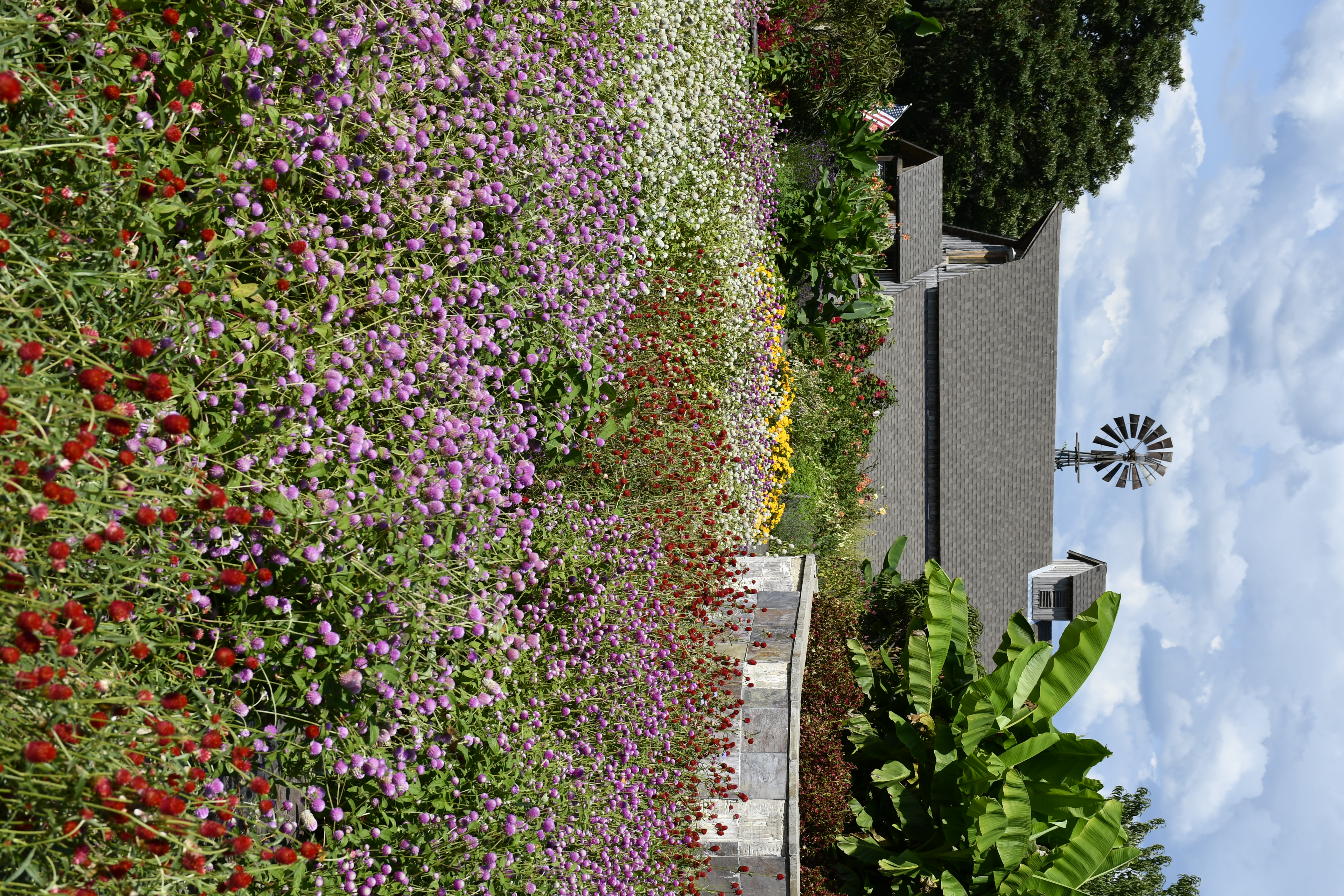
In addition to seed selling, Baker Creek has long been a point of connection for like-minded growers. Today, visitors are welcome to visit the aforementioned Bakersville every Monday through Friday.
Most days, entrance to the village is free. Visitors may stop in at the seed store, which features shelves and jewel-like seed packets. There are other stores, too: one features home goods and baked treats (made by Gettle’s mother), and another offers a touchpoint for Home Folk and the Bulk Herb Store, two businesses owned by Emilee Gettle. They operate in a renovated livery barn offering Western-inspired clothing for men and women, decor, bulk teas, gifts and a tea and espresso bar.
Another stop is the restaurant, which serves an evolving menu of vegan dishes featuring ingredients grown on the farm.
There are also three festivals each year — the Tulip Festival, Spring Planting Festival and Fall Harvest Festival — which draw crowds in addition to ordinary visits.
What are heirloom seeds?
At Baker Creek, the goal is to preserve and share seeds that have been passed down through generations. The company does not sell genetically modified (GMO) seeds; it only sells open-pollinated or heirlooms.
While the latter definition is open to interpretation, “heirloom,” according to Gettle, means “it's kind of an old variety or traditional variety.”
That is a contrast with some facets of the commercial seed industry, which has seen change — particularly in recent decades as larger companies have become increasingly significant in agriculture.
“As recently as 1970, most seed firms were independent,” notes a 2004 report from the U.S. Department of Agriculture. “During the 1970s, most small seed firms vanished, as mergers and acquisitions created a new seed industry structure dominated by large companies with primary investments in related sectors.”
Changes also included the “ownership” and transformation of seeds by corporate owners. In March 2023, the USDA released another report that spoke to the risk for independent seeds:
“A new report released earlier this month by the U.S. Department of Agriculture finds that seed industry consolidation and restrictive intellectual property (IP) regimes are stifling small, independent, and public seed breeding programs,” notes an article published by Food & Power, a website dedicated to “original reporting, resources, and research on monopoly power and economic concentration in the food system.”
“Just four massive corporations sell more than half of all seeds on a global basis, and for many staple commodity crops, like corn, soy, canola, and cotton, just two giants sell the lion’s share of seeds in the U.S. Along with seed sales, these giants control seed breeding programs and use patents and onerous licensing agreements to lock up their genetics and popular patented traits. This severely limits how new, small, or public seed breeders can create new crop varieties and shrinks the number of options for commodity crop farmers, pushing them to buy costly brand-name products.”
In contrast, Baker Creek actively seeks out those seeds that are whole and original. They are sourced from all over the world, and also from people who come to the company to share seeds long held in their family.
“I think pretty much for every generation it's important to keep our old varieties going and to keep our diversity,” Gettle said. “It’s not only good for the planet and good for our food supply, but it's also just really fun to be able to have diversity in the marketplace.”
Looking at the work Baker Creek has done over a quarter-century, does Gettle think that the company has saved some seeds from going away completely?
“As far as whether they would have gone away or not, that's always hard to say,” Gettle said. “You never know for sure if somebody else is keeping it alive. In general, there's definitely a lot of varieties we've kept in commerce and kept popular.”
That research and understanding is key for Baker Creek, which connects the Ozarks to the rest of the world. There is its Petaluma Seed Bank, the aforementioned seed store in California, as well as employees in Japan, India and France who scout seeds and growers, ultimately expanding the company’s knowledge.
Baker Creek associates “work with growers that are already growing for us,” Gettle said. “Like in Japan; they can visit the farmers that are growing the seed, and see how it's doing and see what else they’re working on and what new varieties they might (have) and what they’ve found.”
Testing and trials — in good ways
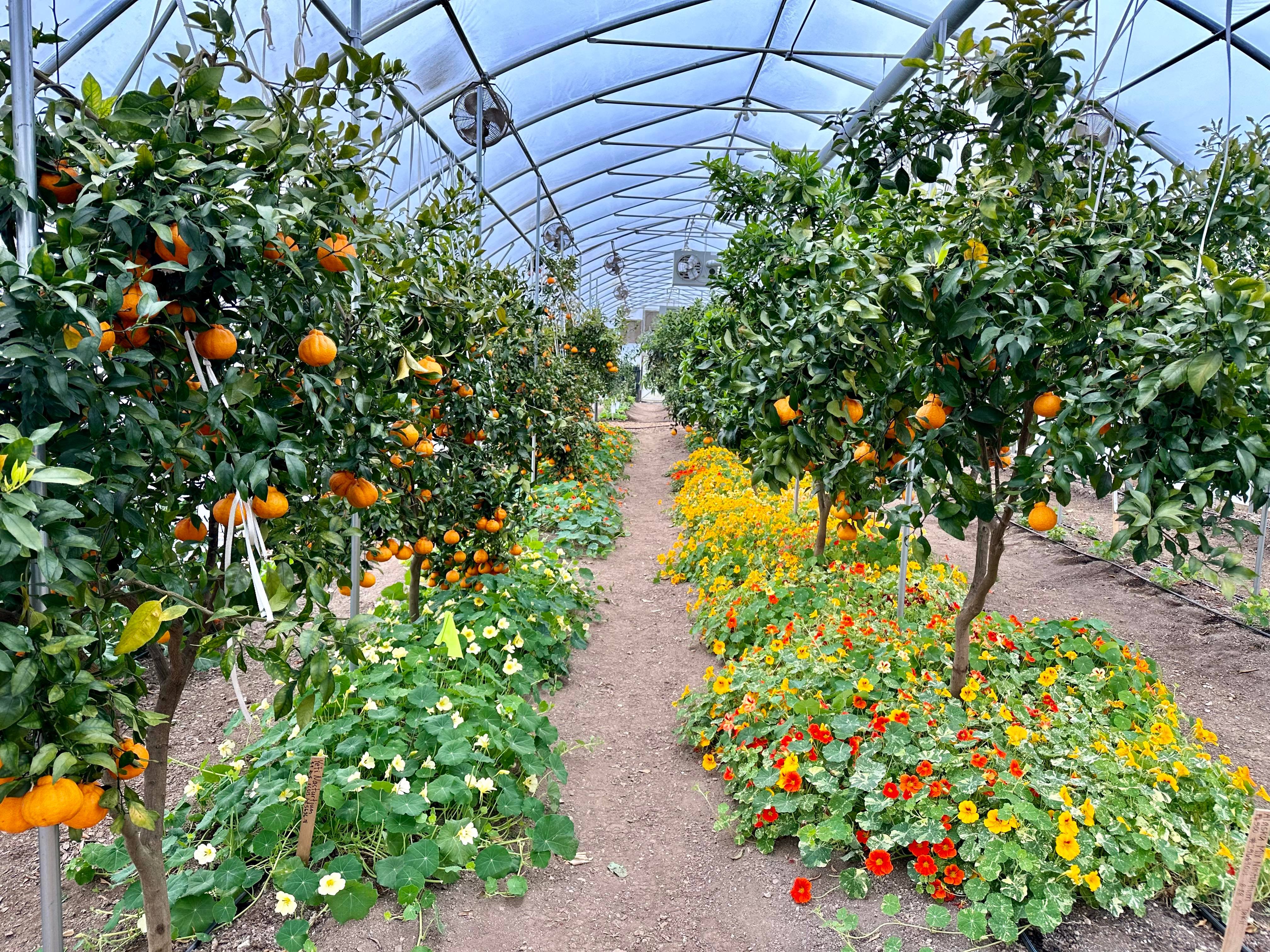
Information can germinate into testing new ideas, and the results are growing in a series of greenhouses at Baker Creek.
Sometimes those tests — like the current focus on pansies and citrus — feel a world away from the chilly day I visited with Andrew Miano, a horticulturist and farmer whose work extends into breeding and de-hybridizing plants to improve seeds in the future.
“It's always something new and different,” said Miano, standing near employees who are trialing flowers and herbs from Baker Creek’s current offerings.
“We're getting opportunities to grow all these different things. Not many people will get the opportunity to grow 300 different types of tomatoes. They might grow one or two in their backyard.”
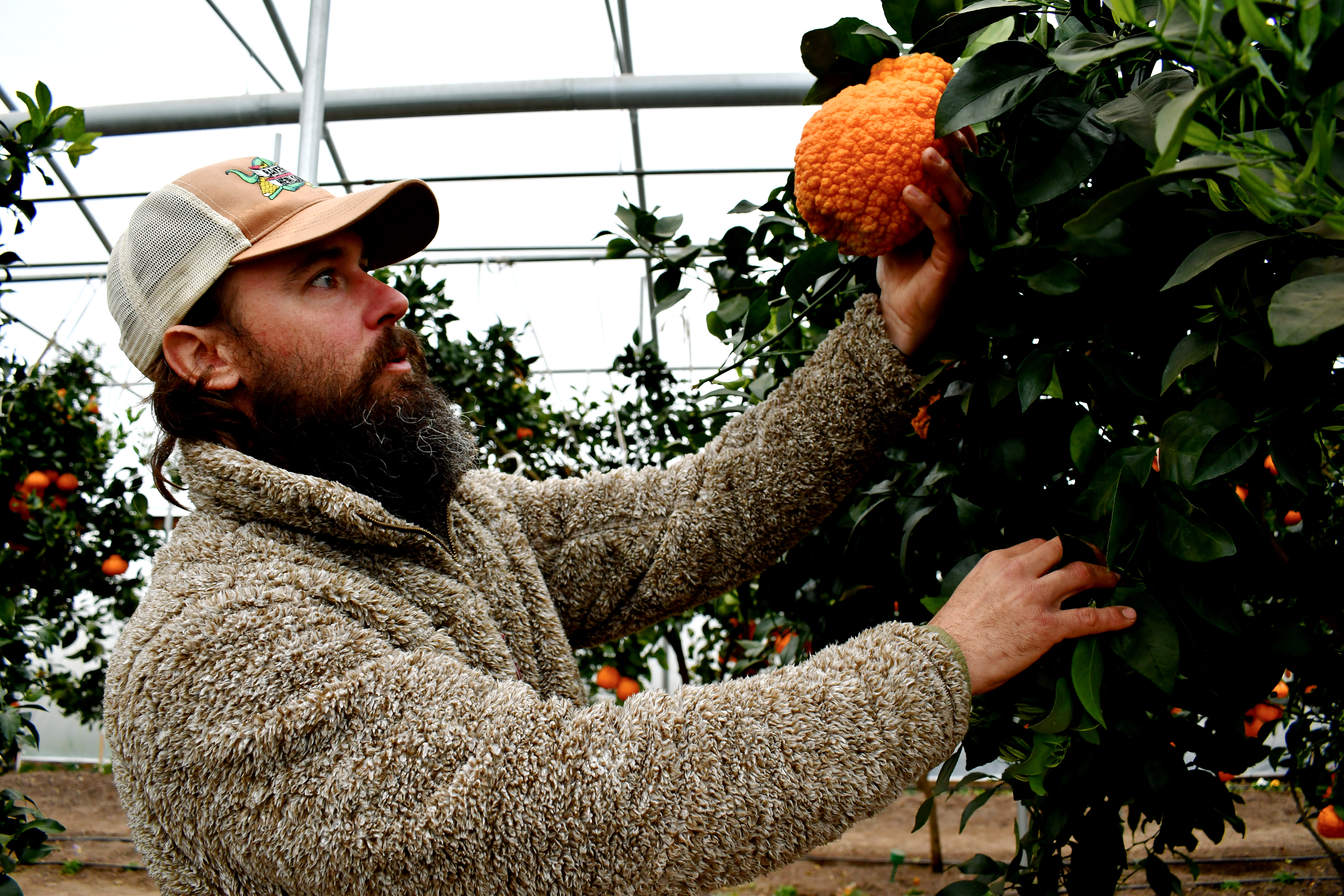
Miano walks with me between greenhouses, opening doors to worlds full of the aforementioned citrus trees and other crops. Recent tests they’ve performed include 20 or 30 new spinach varieties from Japan, some of which are massive “with leaves the size of your head.”
“There's cilantro and arugula in here,” said Miano of one of the greenhouses. “We need all this constant space because we carry so many different varieties. But we're also trialing new kohlrabi varieties that we don't carry. There's four or five different types of purple varieties in here. We're trying to compare it — is it anything new or different or better than what we're already carrying?”
Miano also speaks of seeds that are sent to the company from people who wonder if their varieties might be something Baker Creek is interested in saving. If it is something Baker Creek would like to offer, the people who send in the seeds are often asked if they would like to grow it for the company.
“We'll get things from random people, ‘I love your company. We've been buying seeds from you. My family's had this bean or this pea or this tomato in their family, we've been growing it for the last four generations,’” Miano said. “They’ll send it in. Sometimes they want somebody to help preserve it, so sometimes we can bank it. We'll trial it, see if it's something that we can possibly add to a collection, or just bank it and hold on to it for a rainy day.”
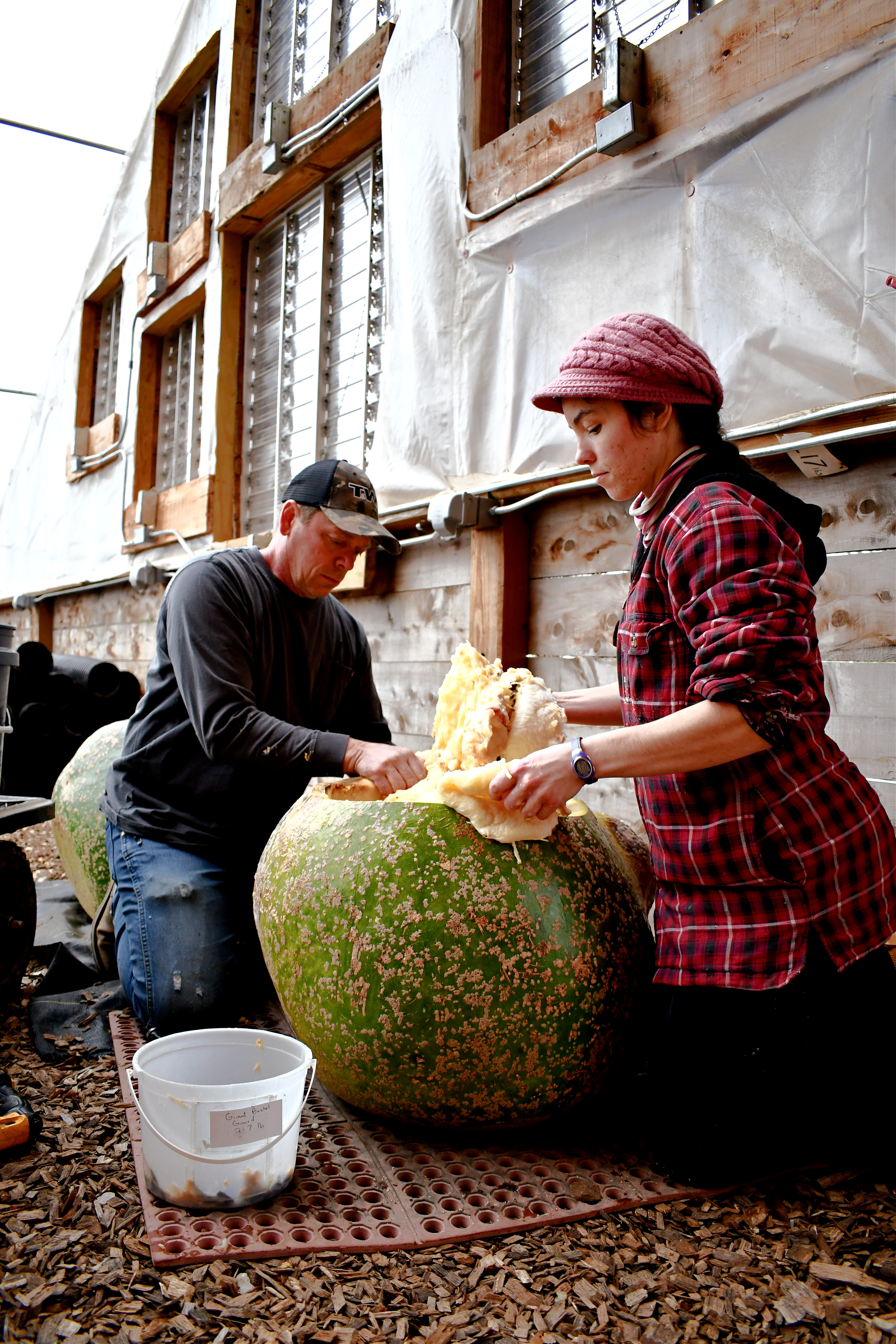
While some crops are tested to see what might be possible, Baker Creek also manages the evaluation of seeds sent from contracted growers.
“The number is fluid, it varies from 150, down to around 125 growers that are located all over the United States and a few international. We set them up with contracts, we make sure that, based upon our supply and demand, we find a grower who can produce a particular crop of seeds for us, and we negotiate with them to get a contract,” said Martin Walsh, Baker Creek’s seed production manager. “We'll help them troubleshoot through the year, we will monitor and track their progress through the season. Then, when their seed is complete, they ship it back to us. And we inspect it and evaluate it for quality.
“That's an incredibly complex and difficult thing to do when you think about all the different skill levels, ages, fertility levels, every farm — even across the road from one another — would be different from each other. We've got to combine over 100 of them and figure out who can do which crop the best.”
Some growers are large operations, while others are small family farms. While the company’s seeds are not certified as organic, many of their growers follow those practices. Baker Creek, too, has signed the “Safe Seed Pledge,” which says “We do not knowingly buy or sell genetically engineered seeds or plants.”
“The seed has to come back to us clean, first of all. It has to be free of debris, rocks, foreign objects, foreign seeds, and it has to germinate,” Walsh said. Those germination requirements are dependent on the type of seeds. For example, tomatoes are 70% and cucumbers are 80%, while okra is 50%.
“If it meets the minimum standard germination rate set by the USDA, then we can buy the seed,” he said, emphasizing that Baker Creek tries to work with growers as much as possible.
“If it doesn't meet that, then we will look at the seed to see if we can do anything to remedy that or rectify that. And if we can, we'll try and we'll ‘germ-test’ it again.”
Shipping to the world
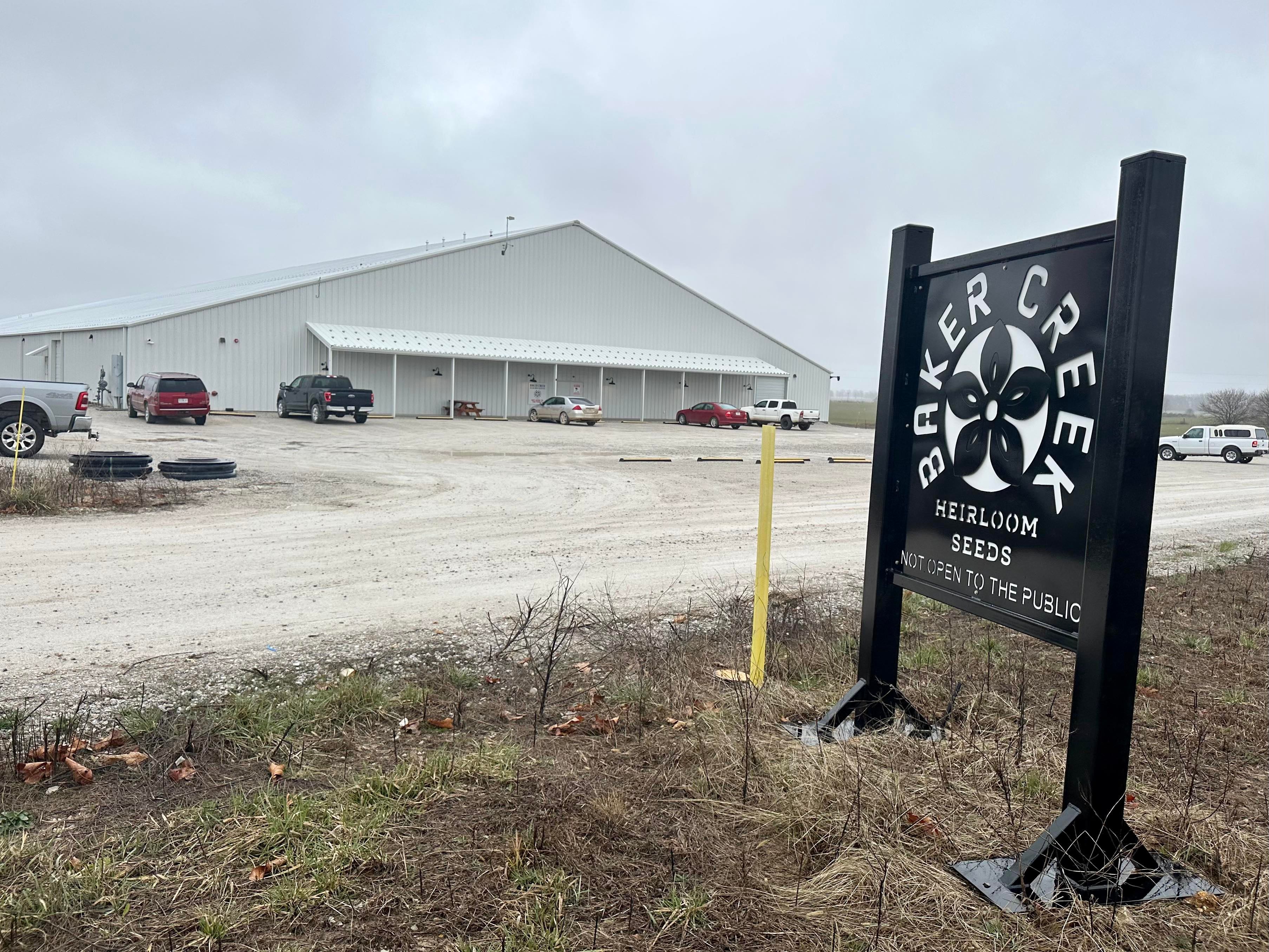
As demand for Baker Creek’s seeds grew, more room — and better roads for large trucks — became a priority. That led to the construction of a new 105,000-square-foot operations center in Seymour, which was completed in 2021.
With traffic buzzing by along Highway 60 — and inside the facility, where going on 60 people work — it feels like a contrast to the tucked-away natural oasis 17 miles away near Mansfield.
In addition to customer service, offices, shipping and storage (among other things), the Seymour building represents Baker Creek-led tech development and implementation for its packing of orders and plants, and was constructed to maintain precise temperature and humidity levels for seeds.
“This building is well-insulated. It’s three times better insulated than a residential house. So when we go out of power for a day or two, it doesn’t matter,” said Xu Chen, quality control manager, who immigrated to the United States from China as a student at Missouri State University.
He comes from a family of gardeners and started his career locally at Pennington Seed before coming to lead Baker Creek’s operations center.
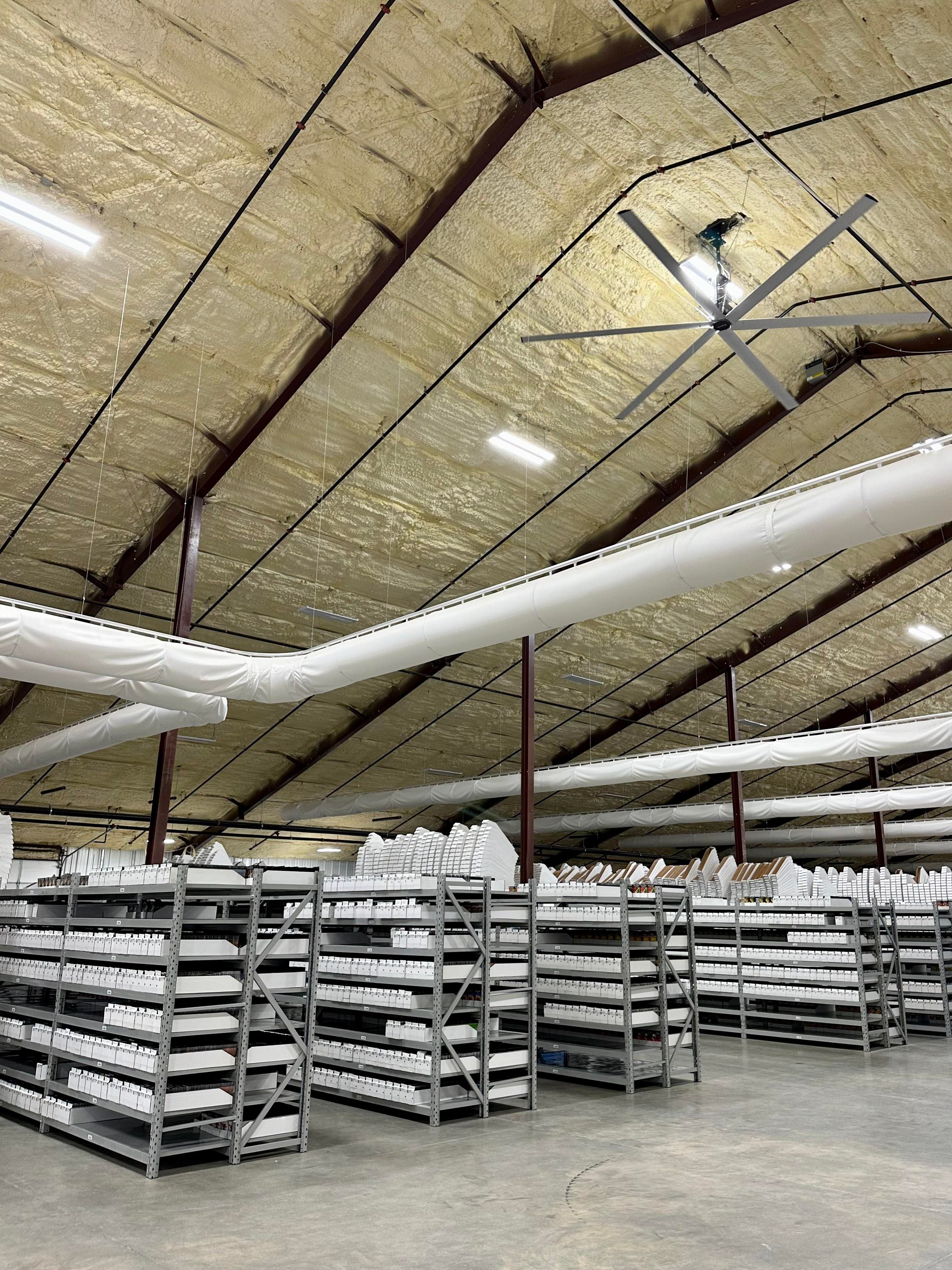
Plans for the large white building were already underway before COVID-19, but as demand grew in light of the pandemic, it was effectively doubled in size.
In addition to space for seeds to be stored, packed and shipped, it also shows how technology has dramatically shifted operations from Baker Creek’s early days.
Even when retired teacher Kathy McFarland answered a “help wanted” ad in the newspaper in 2009, seeds were manually packed with specially-sized spoons and packets were hand-picked from shelves at the seed store to fulfill orders.
“At that point, we were picking all the seed orders from the seed store with a pencil and paper. We were packing all of our seeds by hand with little scoops and little packages,” said McFarland, who today serves as spokesperson and runs the company’s seed donation program, which sends seeds to those in need.
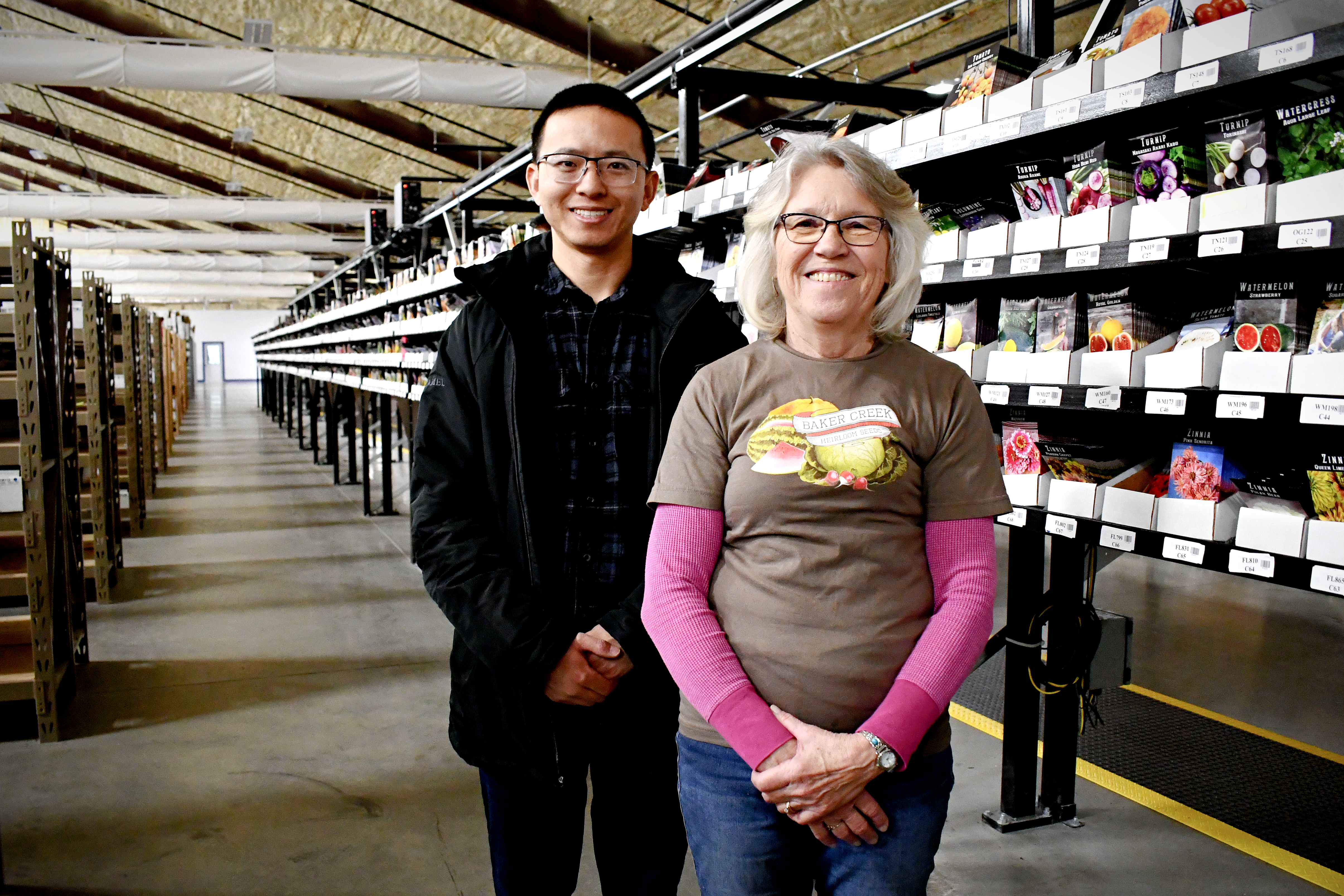
Now, a machine scans a barcode for each order, illuminating the number of seed packets from each bin that workers should pull. Workers place seeds back on the conveyor belt, and at the end of the line, the machine knows how to sort seed packets into particular orders. A version of that system was in use prior to the facility’s construction, but was expanded in 2023, and during the busy season — generally from November to May — runs over two daily shifts to keep up with orders.
“Back in the old days, I worked in the shipping department where we literally typed in every single address for every package that went out,” said McFarland, who notes that a “good” day back then was fulfilling 1,000 orders. “Now they can do 10,000. It makes a big difference.”
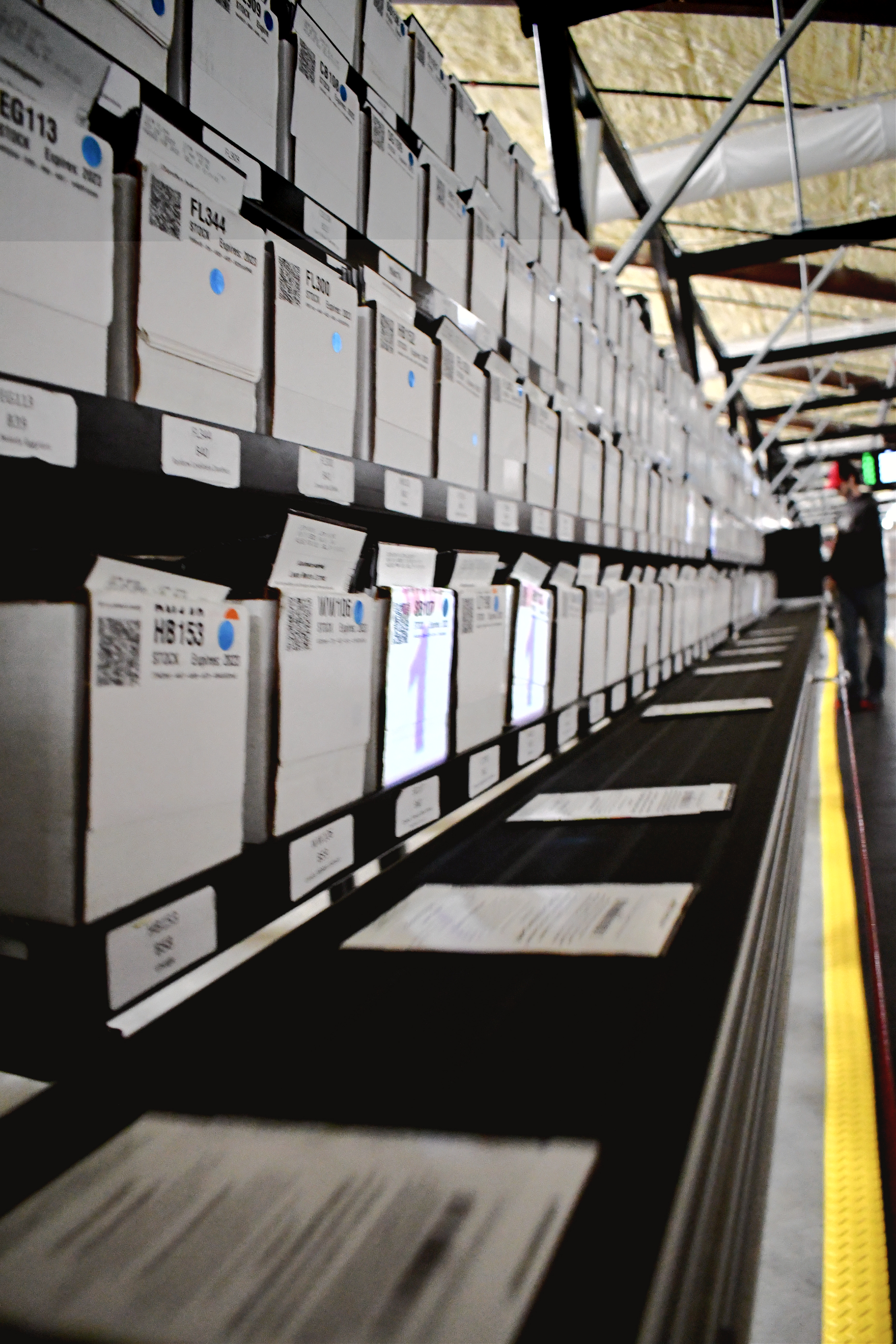
Out back, work also extends to live plants, which technically began last year but expanded significantly in 2023. The plants for sale are generally varieties that are more difficult to start from seed, giving growers a head start.
Each plant — including the likes of sweet potatoes, berries and blue turmeric — is bagged to maintain certain humidity levels and then shipped to growers. The packaging represents an innovative use of a machine, which is typically used for nuts and bolts but provides a good environment for plants. It was quickly sourced when live plants made their soft debut in 2022.
“I got moved out to customer service about three days before we started live plants,” said horticulturist Laine Marler. “That's when I found out about this machine. And they said, ‘Laine, go for it, figure it out.’ And we did.”
There are between 20 and 30 live plant varieties shipped from Baker Creek. After orders are tested, packaged and packed, they go out to those who expectantly await their arrival.
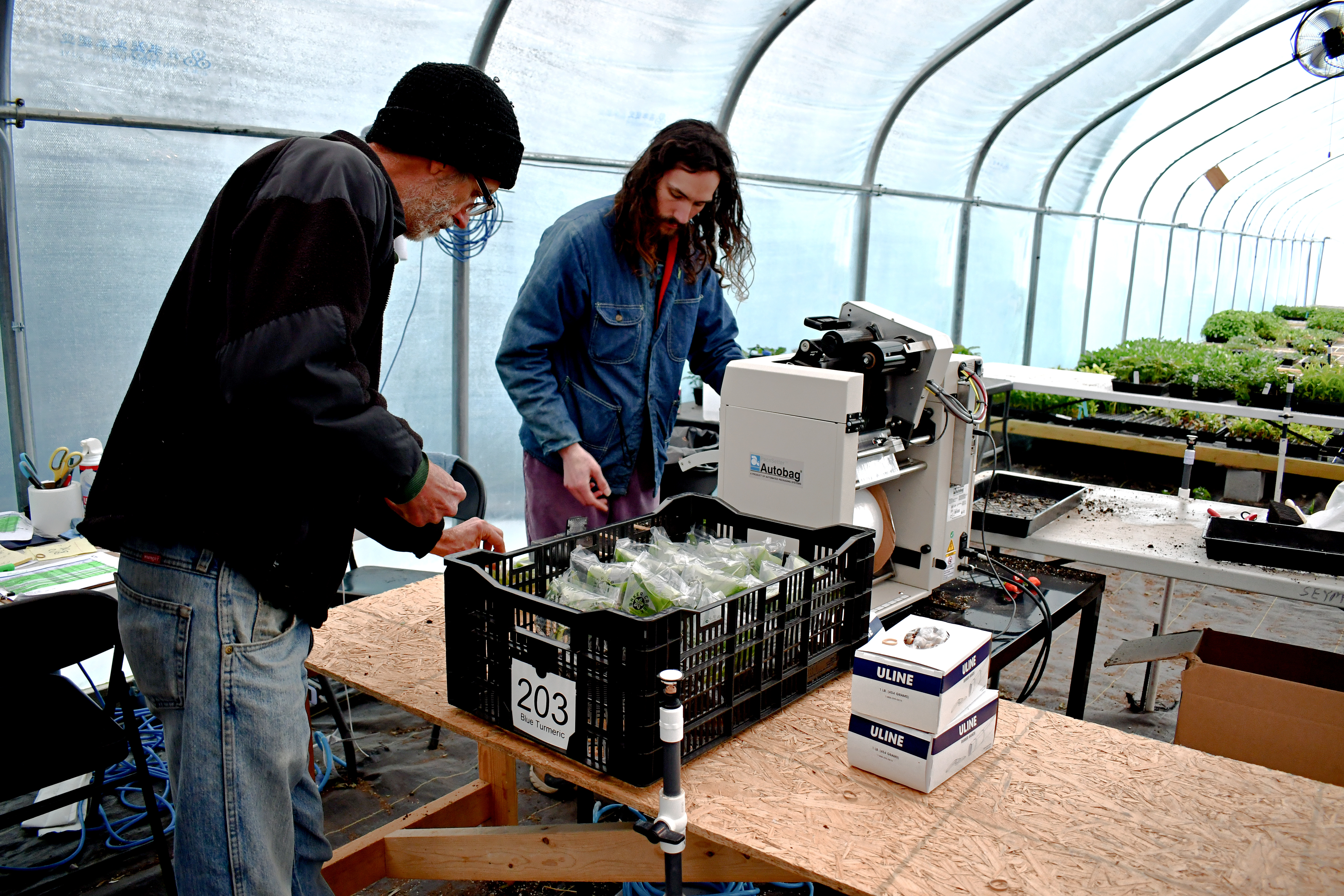
Growing to meet needs
Despite the company’s size and reach, Baker Creek has remained personal in ways that go beyond the customer service staff ready to help.
While in a physical sense that connection is obvious, Gettle’s dedication — perhaps from the fact that he once did it all, or his care or vision, or all and more — has led him to remain ingrained in many aspects of the company. That comes through on many levels, from approving photos for seed packets to partnerships and philanthropy.
Fostering those connections is part of why Baker Creek is here in the first place. It was catalogs that helped capture Gettle’s attention as a teenager. And they are a way to help others envision what could be.
“Images and stories would bring you into the picture,” Gettle said. “That's kind of what we're trying to create in the catalogs now. To help many people have the feeling of, ‘Hey, I could do that,’ or, ‘I want to learn.’ Make it feel like they're in the Netherlands or wherever in the picture. It's kind of bringing it alive a little bit.”
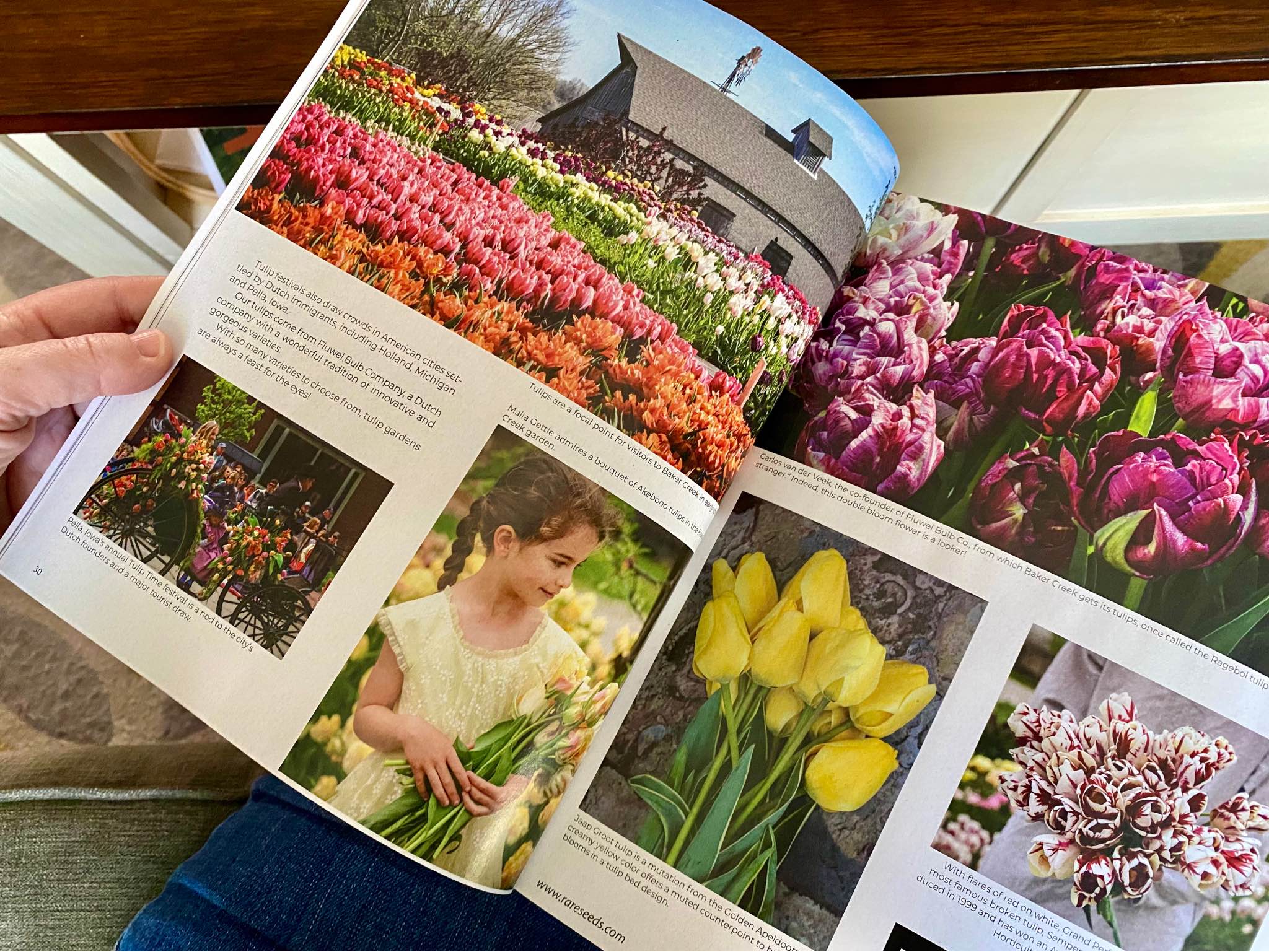
Despite its humble start, the gradual expansion of ideas and avenues has made the enormous expansion of the company feel real, Gettle says.
“There are things that sometimes — like the amount of orders we get — just seems impossible. I look at the figures and it’s like ‘How can that be? How can it be that many people be ordering?’” he said. Yet, in contrast: “If you think about the finances day-to-day, what it takes every day to keep up with — you don't want to think about it too hard. You're like, ‘Hey, if we don't get so many orders every single week…’”
While those factors are ongoing realities, they are only one aspect of the business. Others tie back to connections: meeting people, and helping provide connections between food culture, whether in the United States or bringing other countries home.
“Probably the biggest thing is finding just really unique and unusual varieties; finding a new pansy or a new tomato or something that I haven't seen yet,” said Gettle of what he finds fulfilling. “Growing it and tasting it and trying different things; trying things that aren't supposed to work. Finding varieties that will grow here. Figuring out how to grow things bigger and better. New varieties, I think, is the biggest thing — and then connecting people with those varieties.
“It’s kind of a combination — because people introduce us and you meet those people, and you pass the varieties on to other people. It's the whole connecting people; sometimes with their past, like their historical varieties, but then also introducing people to varieties that might be from a different culture.
“There's not a single piece I don't really enjoy other than taxes and paperwork.”
Click here to learn more about Baker Creek Heirloom Seed Company.

